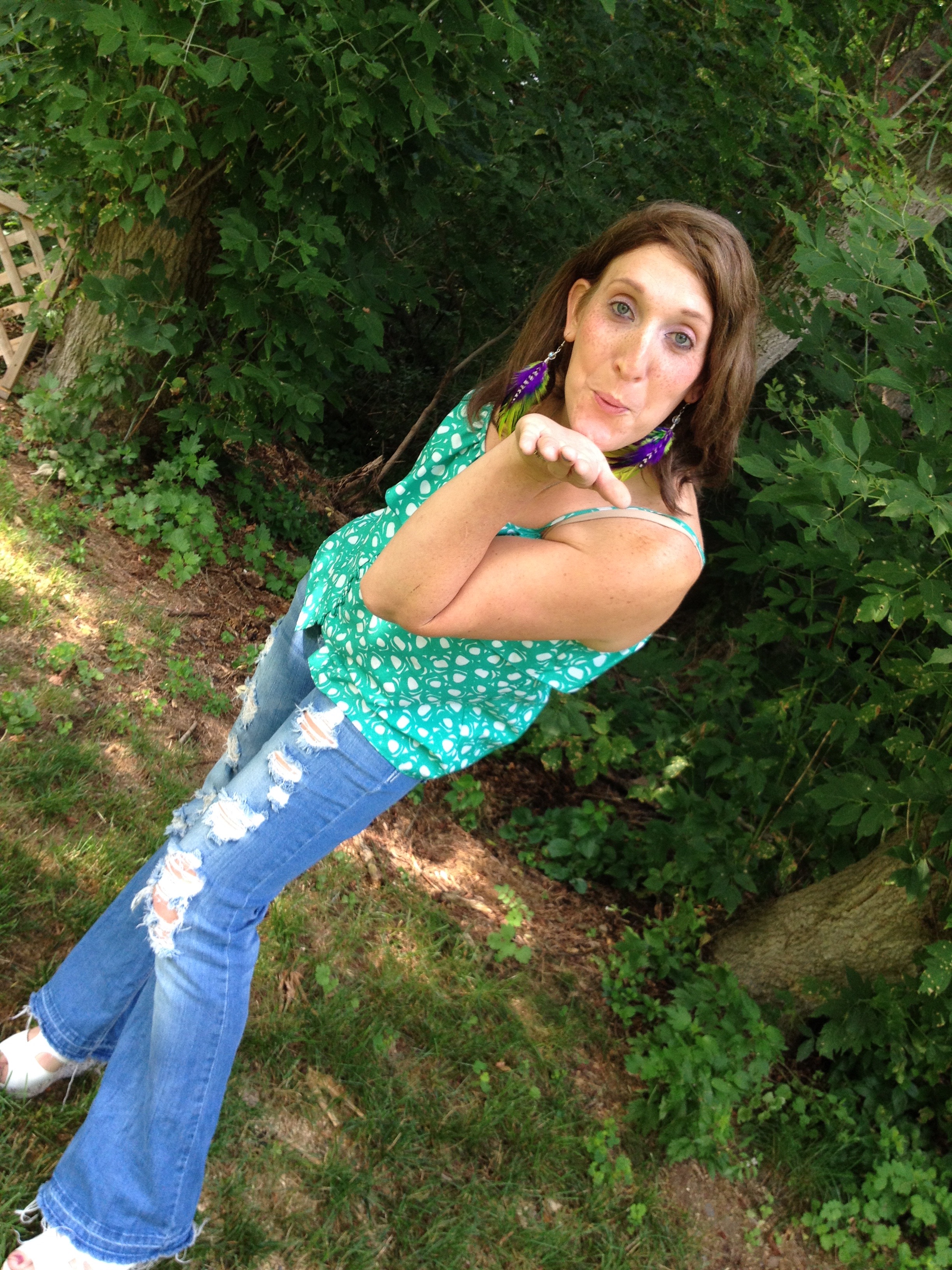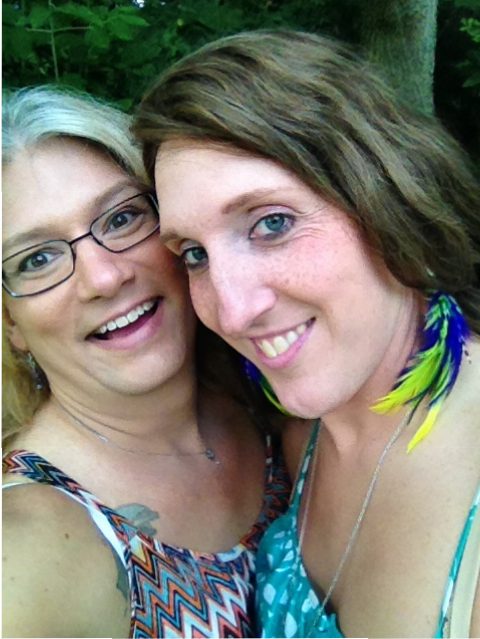When her youngest child came out as transgender, this woman recognized her own truth.
This is part of a story series about the lives of transgender people. Read the introduction here.
 From the time she was young, Jacqui Leaonna Turner didn’t understand why the males were prettier than the females in every species in the animal kingdom except for humans. Having been assigned male gender at birth, she was confused about why it wasn’t okay for her to put on nail polish with the girls she hung out with.
From the time she was young, Jacqui Leaonna Turner didn’t understand why the males were prettier than the females in every species in the animal kingdom except for humans. Having been assigned male gender at birth, she was confused about why it wasn’t okay for her to put on nail polish with the girls she hung out with.
Her mother would tell her, “Boys don’t do that kind of stuff” when she’d come home with nail polish on. When she asked her father about the animal kingdom, he told her a story about the birds and the bees, which didn’t help much.
I didn’t know the word ‘transgender.’ I didn’t know why I felt more comfortable wearing my mom’s and sister’s clothes or playing dress-up with my girlfriends. I remember going through puberty and it hit me so hard. I didn’t feel like I should have a penis. It wasn’t right. But I managed to deal with it. My parents were very proud of their ‘son’ and I didn’t want to disappoint them.
So Jacqui did what so many transgender people do, at least at first: She tried to conform. She was an Eagle Scout, went to college, got married and did all the things she was told she was supposed to do. But she would dress in women’s clothes in secret, and when her marriage failed after nearly six years — and two children — Jacqui later realized that her struggles with her gender identity played a role in the relationship’s downfall.
After her divorce, though, Jacqui struggled even more.
“At that point, I was trying to figure myself out,” she says. “I almost tried to commit suicide a couple of times. I felt like nobody loved me, that the world hated me — I didn’t feel like myself. I didn’t know what these feelings were called at the time, but I knew I didn’t relate to derogatory terms like ‘she-male.’”
But it was then that Jacqui’s life took an unexpected turn. One of her two sons, who was three years old at the time, began displaying signs of being transgender. It wasn’t long before Jacqui’s younger child began dressing like a girl and identifying as female, including using a girl’s name.
I thought, ‘She feels the same way I do.’ I started feeling terrible, like I’d given her this disorder even though she’d never seen me dress, I’d never expressed as female. I thought, ‘What have I done to my child?’ I kept my mouth shut and began presenting as even more masculine. But I started feeling very jealous of her, even as I started hating myself, thinking I’d corrupted her.
Jacqui began seeing a therapist. She talked about her daughter and her own situation, and within about three months her therapist told Jacqui, “You’re transgender.”
Jacqui says it was the first time she’d heard the word “transgender” and she tried to deny it. But an experience with her then-five-year-old daughter changed all that, she says.
She was on the playground, wearing a dress. Some boys stopped her and started giving her attitude. I headed over there and heard her yelling at them, ‘I’m not a boy! I’m a girl! And you will treat me like a girl!’
I was floored. Here’s this five-year-old telling boys how she feels. It hit me like a ton of bricks. I thought, ‘If she can tell the world how she feels, why can’t I?’
After talking it through with her therapist, Jacqui decided she’d start transitioning. At first, she wanted to wait until her children both turned 18, but it didn’t take long to realize she couldn’t go on as she was for the next 15 years. So in 2015, at the age of 36, Jacqui began hormone replacement therapy
“It has been the best turnaround in my life, ever,” Jacqui says. “I’m so much more connected with myself, so much happier — and it’s not only that. The bond between both my daughter and son has become extremely cemented and strong. I’m no longer angry all the time — as a father, I felt I had to play this authoritarian role. It’s so much better now.”
She admits that both her children, who are now seven and nine years old, were a little taken aback when she first told them about her transition — especially her son, who Jacqui says wasn’t quite sure what to think about this change in the male role model in his life. But they soon realized how much better it was for all of them for Jacqui to be her authentic self.
I assured him I’d do everything Daddy always did. Daddy does collision and body work, and I’m still going to pull motors out of cars and do body work. I’m still going to throw the football. That won’t change, I told him. I’ll just be prettier.
He gets it now, a year later, because we still throw a football back and forth. And it’s so cool because now he protects me. If somebody says something he’ll say, ‘That’s my Dad. She’s pretty cool. She does her makeup and looks pretty but she knows how to pull motors out of cars.’ He’s proud. Everything’s changed for the better.
 As a result of living authentically, Jacqui has also found the lifelong love she wasn’t sure she’d ever have. She says she had been so lost for so long she was simply happy to find her true self when she transitioned, and made her peace with the idea that she might have to go it alone. But she’s grateful she doesn’t have to, now that she’s engaged to Kara Marie Ramsey. (You can read more about Kara and the couple’s relationship HERE.)
As a result of living authentically, Jacqui has also found the lifelong love she wasn’t sure she’d ever have. She says she had been so lost for so long she was simply happy to find her true self when she transitioned, and made her peace with the idea that she might have to go it alone. But she’s grateful she doesn’t have to, now that she’s engaged to Kara Marie Ramsey. (You can read more about Kara and the couple’s relationship HERE.)
The two met at a support group for transgender people and Jacqui says she felt an instant connection to Kara. Their love grew out of mutual respect for each other’s strength and honesty, and their shared experience of being transgender.
“We get each other, and having been in the same shoes deepens our love for each other because of where we came from and where we are today,” Jacqui says. “A lot of our trans sisters and brothers look up to us because they’re afraid of a relationship, and we can show others that you can find love.”
Read all the stories in this series HERE.
[Photos courtesy of Jacqui Leaonna Turner.]



